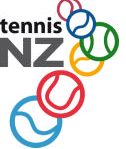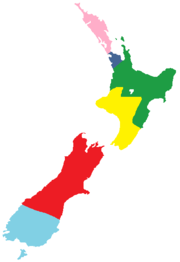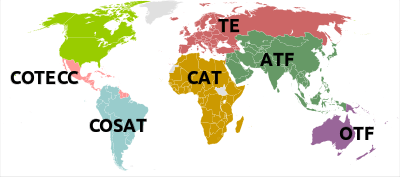Tennis New Zealand
Coordinates: 36°52′45″S 174°50′35″E / 36.87929°S 174.842992°E
 | |
| Sport | Tennis |
|---|---|
| Jurisdiction | National |
| Abbreviation | (TNZ) |
| Founded | 1886 |
| Affiliation | International Tennis Federation |
| Affiliation date | 16 March 1923 |
| Regional affiliation | Oceania Tennis Federation |
| Affiliation date | 1993 |
| Headquarters | The Millennium Institute of Sport and Health |
| Location | 17 Antares Place, Mairangi Bay, Auckland |
| Chairman | David Patterson |
| Chief Exec | Steve Johns |
| Coach | Marcel Vos |
| Replaced | New Zealand Lawn Tennis Association |
| Official website | |
|
www | |
|
| |
Tennis New Zealand (commonly known by the acronym Tennis NZ or TNZ) (formally the New Zealand Lawn Tennis Association) is the governing body of tennis in New Zealand. Founded in 1886, it is one of the world's oldest tennis associations.[1] It is affiliated to both International Tennis Federation and Oceania Tennis Federation. Tennis NZ has six geographically divided regional centres. Tennis NZ operates all of the New Zealand's national representative tennis sides, including the New Zealand Davis Cup team, the New Zealand Fed Cup team and youth sides as well. Tennis NZ is also responsible for organising and hosting tennis tournaments within New Zealand and scheduling the home international fixtures.
History
The history of tennis in New Zealand dates back to the 1870s, the decade when the development of modern tennis began. The first New Zealand Tennis Championships were played at Farndon in Hawkes Bay in 1886. New Zealand Lawn Tennis Association (NZLTA) was formed at a meeting held in Hastings in December 1886. Shortly after its inauguration, the New Zealand Association became affiliated with the Lawn Tennis Association (England).[2] In 1904 New Zealand Lawn Tennis Association amalgamated with six Australian state tennis associations to form the Lawn Tennis Association of Australasia. New Zealand Lawn Tennis Association played a significant role in the origin of the Australian Open. Lawn Tennis Association of Australasia created the tournament called The Australasian Mens Championships (which later became Australian Open) in 1905 and was first played in Warehouseman's Cricket Ground and it was decided that championships would be hosted by both Australian as well as New Zealand venues.[3] New Zealand hosted the championship twice— Christchurch (1906) and Hastings (1912). The geographical remoteness of both the countries (Australia and New Zealand) made it difficult for foreign players to enter the tournament. In Christchurch in 1906, of a small field of 10 players, only two Australians attended, and the tournament was won by a New Zealander (Tony Wilding).[4][5] Lawn Tennis Association of Australasia was one of the twelve national associations of tennis which established the International Lawn Tennis Federation (ILTF) in a conference in Paris, France on 1 March 1913.[6] From 1905 until 1919, New Zealand and Australian tennis players participated in the International Lawn Tennis Challenge (Davis Cup) under the alias of "Team Australasia", the team claimed a title six times (1907, 1908, 1909, 1911, 1914, 1919), however, there were attempts to severance this trans-tasmanian partnership, in order to allow New Zealand players to represent their nation on international tennis events.[7] In 1922, New Zealand dropped out from this partnership and on 16 March 1923 New Zealand Lawn Tennis Association was granted affiliation to the International Lawn Tennis Association and thereby became eligible to enter the International Lawn Tennis Challenge in its own right.[8][9] New Zealand Lawn Tennis Association filed its first challenge with United States Lawn Tennis Association for 1924 International Lawn Tennis Challenge.[10] Tennis New Zealand was the founding member of Oceania Tennis Federation in 1993.
Structure
Governing staff
| Chief Executive Officer | Steve Johns |
| Tennis NZ Staff Members | |
| Chairman | David Patterson |
| National Coach | Marcel Vos |
| National Game Development Manager | Jamie Tong |
| Coach Education Co-ordinator | Craig Bell |
| National Events Co-ordinator | Daniel Shepherd |
| National Participation Programs Manager | Jenny Lovegrove |
| Finance Administrator | Roger Watson |
| Program Support Administrator | Amy March |
Constitution
The constitution of the organisation was adopted on 12 August 2006 in the Special General Meeting in which the main purpose of the organisation is defined as to promote, develop, enhance and protect the sport of tennis mainly as an amateur sport for the recreation and entertainment of the general public in New Zealand.[11]
Affiliates
Regional centres

Tennis NZ consists of six regional centres with clearly defined geographical boundaries. These regional centres, which are affiliated to the national body, control their own activities subject to any requirements which may, from time to time, be legislated for by the national body.[12]
| Region | Centre | Headquarter | CEO |
|---|---|---|---|
| Northern | Tennis Northern | Albany | David Frank[13] |
| Auckland | Tennis Auckland | Auckland | Robyn Kiddle[14] |
| Waikato-Bay | Tennis Waikato-Bays | Hamilton East | Leslie Wilkinson[15] |
| Central | Tennis Central | Wellington | |
| Canterbury | Canterbury Tennis | Christchurch | Neil Prior[16] |
| Southern | Tennis Southern | Dunedin |
Organisations
Tennis NZ affiliates several different tennis related private organisations, which are:[2]
- Aotearoa Maori Tennis Association (AMTA) - national tennis body of Māori people.[17]
- NZ Tennis Umpires Association (NZTUA) - national body, which governs tennis officiating in New Zealand.[18]
- Tennis Coaches NZ (TCNZ) - New Zealand's association for professional tennis coaches.[19]
- International Lawn Tennis Club of NZ - member of Council of International Lawn Tennis Clubs, established in 1956 and has around 130 members.[20]
- NZ Wheelchair Tennis - Hamilton based organisation affiliated with International Wheelchair Tennis Association (IWTA) governs Wheelchair tennis in New Zealand.[21]
- Seniors Tennis NZ - national association for tennis players aged 35 years and above.[22]
Tournaments
Tennis NZ annually organises range of events from local tournaments to national and international events.[23] Tennis Auckland hosts two major events of international tennis tournaments each year at the ASB Tennis Centre, Parnell, just prior to Australian Open:[24][25]
- Heineken Open - is the biggest men’s professional tennis event in New Zealand, held in Auckland since 1956. Played in the week prior to the Australian Open, the tournament is part of the ATP World Tour 250 series.
- ASB Classic - is a most prominent women's tournament of New Zealand. Held since 1986, this WTA Tour event is an International series tournament and is played on outdoor hardcourts during the first week of the tennis season.
References
- ↑ Ryan, Greg (2004). The Making of New Zealand Cricket, 1832–1914. Routledge. pp. 22–23. ISBN 0-7146-8482-1.
- 1 2 "About Tennis NZ". Tennis New Zealand's official website. Retrieved 17 March 2011.
- ↑ "The Origin of Australian Open Tennis History". Tennis Theme. Retrieved 18 March 2011.
- ↑ "Champions - Men's Singles". Australian Open. Retrieved 18 March 2011.
- ↑ "Grand Slam Tournaments - Australian Open (Men's Singles)" (PDF). United States Tennis Association. Retrieved 18 March 2011.
- ↑ "History of the ITF". International Tennis Federation's official website. Retrieved 17 March 2011.
- ↑ "History – Australia's Davis Cup success". Tennis Australia's official website. Retrieved 19 April 2011.
- ↑ Foenander, Tristan. "History of the Australian Open – the Grand Slam of Asia/Pacific". Australian Open. Retrieved 18 March 2011.
- ↑ "Canada admitted to NET Federation". The Leader (Leader-Post). 17 March 1923. p. 10. Retrieved 19 April 2011.
- ↑ "New Zealand Challenges". The Schenectady Gazette (The Daily Gazette). Schenectady, New York. 6 February 1924. p. 11. Retrieved 19 April 2011.
- ↑ "Constitution of the organisation". Tennis New Zealand. Retrieved 17 March 2011.
- ↑ "Regional Centres". Retrieved 17 March 2011.
- ↑ "Contact Us". Tennis Northern. Retrieved 30 March 2011.
- ↑ "Contact Us". Tennis Auckland. Retrieved 30 March 2011.
- ↑ "Contacts". Tennis Waikato-Bays. Retrieved 30 March 2011.
- ↑ "Contact Canterbury Tennis". Canterbury Tennis. Retrieved 30 March 2011.
- ↑ "Aotearoa Māori Tennis Association - a Brief History". Aotearoa Maori Tennis Association. Retrieved 27 March 2011.
- ↑ "About the NZTUA". NZ Tennis Umpires Association. Retrieved 27 March 2011.
- ↑ "TCNZ - Tennis Coaches New Zealand". Tennis NZ. Retrieved 27 March 2011.
- ↑ "Welcome to the IC of New Zealand". International Lawn Tennis Club of New Zealand. Retrieved 27 March 2011.
- ↑ "Member Nations - Contact Details For Member Nations - New Zealand". International Tennis Federation. Retrieved 27 March 2011.
- ↑ "Welcome to Tennis Seniors in New Zealand". Tennis NZ - Seniors Tennis NZ. Retrieved 27 March 2011.
- ↑ "Tennis New Zealand Tournament Calendar January – December 2011". Tennis New Zealand. Retrieved 30 March 2011.
- ↑ Romanos, Joseph (8–14 January 2005). "Our tennis open". New Zealand Listener. p. 2. Retrieved 30 March 2011.
- ↑ "ASB Classic & Heineken Open". Tennis New Zealand. Retrieved 30 March 2011.
External links
- Official website
- Tennis NZ website, oriented towards children

